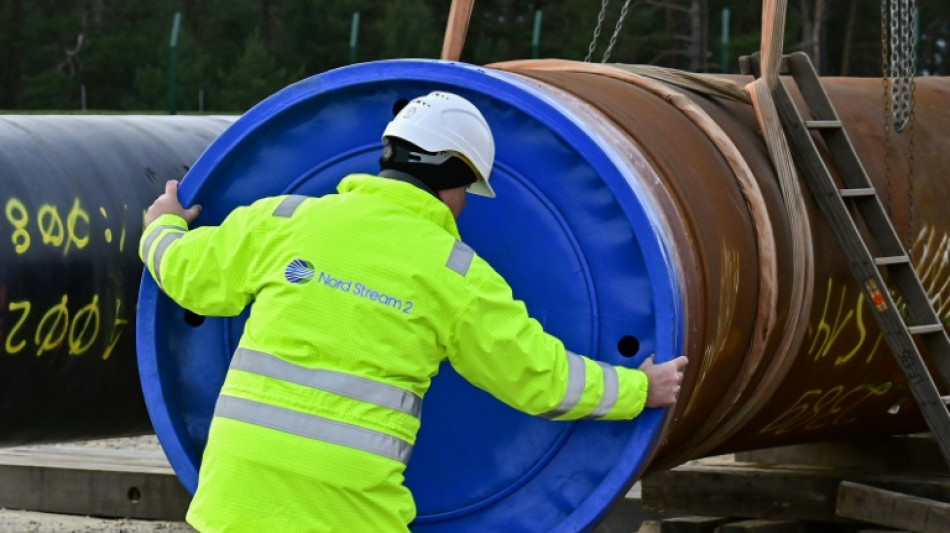
-
 Jurgen Klopp to target player welfare in Red Bull role
Jurgen Klopp to target player welfare in Red Bull role
-
Volkswagen sees 'painful' cost cuts ahead as profit plunges

-
 Spain races to save victims as floods kill 62
Spain races to save victims as floods kill 62
-
Tuberculosis cases hit record high: WHO
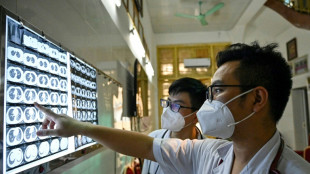
-
 Volcanoes 'hidden source' of CO2 in past climate change: study
Volcanoes 'hidden source' of CO2 in past climate change: study
-
Eurozone economy grows faster than expected

-
 Mediators to propose Gaza truce amid deadly Israeli strikes
Mediators to propose Gaza truce amid deadly Israeli strikes
-
China's Hisense first sponsor of new Club World Cup

-
 Georgia prosecutors probe alleged election 'falsification'
Georgia prosecutors probe alleged election 'falsification'
-
New Zealand's Ajaz 'emotional' on Mumbai return after perfect 10

-
 Trump, Harris in frantic campaign push as US election nears
Trump, Harris in frantic campaign push as US election nears
-
Worries for Japan economy after election shock

-
 Israel short on soldiers after year of war
Israel short on soldiers after year of war
-
Volkswagen profit plunges on high costs, Chinese slump

-
 De Zorzi out for 177 as S.Africa power to 413-5 against Bangladesh
De Zorzi out for 177 as S.Africa power to 413-5 against Bangladesh
-
'CEO of supercute': Hello Kitty turns 50

-
 Australia head coach McDonald handed new deal until 2027
Australia head coach McDonald handed new deal until 2027
-
Visual artist grabs 'decisive moment' to nurture Chad art scene
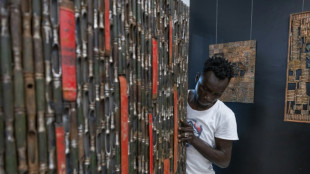
-
 Industrial slump leaves Germany on brink of recession
Industrial slump leaves Germany on brink of recession
-
'I'm terrified': French auteur Audiard hits Oscars trail for 'Emilia Perez'

-
 New Indonesia defence chief harks back to dictator's rule
New Indonesia defence chief harks back to dictator's rule
-
In Tennessee, the despair of gun control advocates

-
 US economy's solid growth unlikely to register at ballot box
US economy's solid growth unlikely to register at ballot box
-
'A treasure': Japan's Ohtani a hometown hero win or lose in World Series

-
 Botswana votes with ruling party seeking to extend six decades of power
Botswana votes with ruling party seeking to extend six decades of power
-
Bitcoin close to record as cautious markets eye US election

-
 Hometown hero Volpe lives dream with grand slam for Yankees
Hometown hero Volpe lives dream with grand slam for Yankees
-
Rested relief pitchers please Roberts even after Dodgers defeat

-
 UK's Labour govt prepares to deliver decisive first budget
UK's Labour govt prepares to deliver decisive first budget
-
Volpe's grand slam helps Yankees avoid World Series sweep

-
 Taiwan battens down for Super Typhoon Kong-rey
Taiwan battens down for Super Typhoon Kong-rey
-
MotoGP world title in sight as Martin, Bagnaia set for Sepang duel

-
 'New wave' as start-up sweeps up Thai ocean plastic
'New wave' as start-up sweeps up Thai ocean plastic
-
Botswana votes with ruling party aiming to extend six decades of power

-
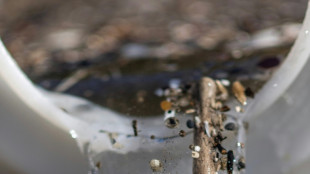 How harmful are microplastics to human health?
How harmful are microplastics to human health?
-
Are bioplastics really the wonder alternative to petro plastics?

-
 Rumble in the Jungle remembered after 50 years
Rumble in the Jungle remembered after 50 years
-
Trump risks backlash with anti-trans ads targeting Harris

-
 Alzheimer's patient 'relieved' at Quebec's assisted suicide policy shift
Alzheimer's patient 'relieved' at Quebec's assisted suicide policy shift
-
Who should get paid for nature's sequenced genes?
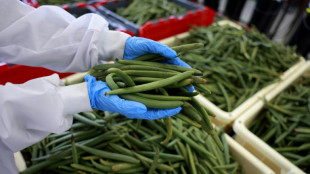
-
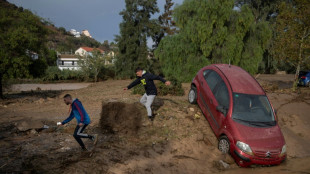 Bodies found as torrential rains slam Spain
Bodies found as torrential rains slam Spain
-
Climate change driving 'record threats to health': report
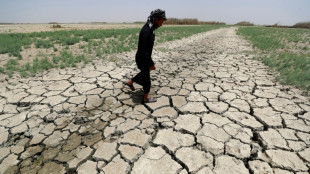
-
 Harris warns of 'obsessed' Trump power grab at mass Washington rally
Harris warns of 'obsessed' Trump power grab at mass Washington rally
-
Southampton, Brentford scrape into League Cup quarter-finals

-
 PGA players council seeks smaller fields, fewer full tour spots
PGA players council seeks smaller fields, fewer full tour spots
-
Napoli extend lead at top of Serie A with win at AC Milan

-
 Jennifer Lopez to boost Harris at glitzy Las Vegas event
Jennifer Lopez to boost Harris at glitzy Las Vegas event
-
Global stocks mixed as markets await Big Tech results

-
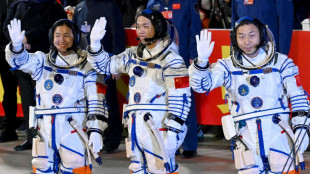 Three-person crew blasts off for China's Tiangong space station
Three-person crew blasts off for China's Tiangong space station
-
Google reports strong growth driven by AI, Cloud
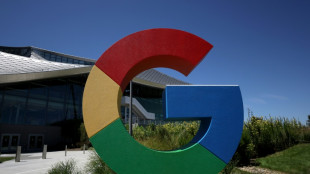
| RBGPF | 100% | 62.35 | $ | |
| CMSC | -0.65% | 24.57 | $ | |
| SCS | -3.11% | 12.21 | $ | |
| NGG | -1.35% | 65.12 | $ | |
| BCC | -5.3% | 131.64 | $ | |
| GSK | 0.76% | 38.17 | $ | |
| AZN | -1.05% | 75.22 | $ | |
| BTI | -1.31% | 34.46 | $ | |
| RELX | -0.52% | 47.91 | $ | |
| RIO | 0.6% | 66.58 | $ | |
| RYCEF | 0.55% | 7.25 | $ | |
| BCE | -0.71% | 32.46 | $ | |
| JRI | -0.69% | 12.98 | $ | |
| CMSD | -0.16% | 24.84 | $ | |
| VOD | -2.8% | 9.28 | $ | |
| BP | -5.76% | 29.36 | $ |

Germany halts controversial Russian pipeline project
Germany on Tuesday put on ice the controversial Nord Stream 2 pipeline in response to Moscow's recognition of two breakaway regions in eastern Ukraine, finally halting the 10-billion-euro project that has long irked allies.
Berlin had over the years doggedly pursued the pipeline which was set to double natural gas import capacity from Russia, despite opposition from the United States and Eastern Europe which fear it would leave the continent too dependent upon Russian energy.
Through controversies that had weighed on German-Russian ties -- from the poisoning of Kremlin critic Alexei Navalny to several spying scandals to a series of cyberattacks, the German government had pushed on with the project, which was finally completed last year and was awaiting regulatory approval.
But hours after Putin's decision on recognising separatists in eastern Ukraine, German Chancellor Olaf Scholz said on Tuesday he had asked for the approval process to be halted, despite a severe energy crisis that has sent gas prices soaring in Europe.
"That sounds technical, but it is the necessary administrative step so there can be no certification of the pipeline and without this certification, Nord Stream 2 cannot begin operating," he said.
The White House immediately hailed the decision, while Ukrainian Foreign Minister Dmytro Kuleba called it "a morally, politically and practically correct step in the current circumstances".
Meanwhile Dmitry Medvedev, vice president of Russia's council of security said Germany was just shooting itself in the foot.
"The German chancellor Olaf Scholz has asked to suspend the certification of Nord Stream 2... well, welcome to the new world where Europeans will soon pay 2,000 euros for 1,000 cm3 of gas," he tweeted.
- Rising tensions -
Germany's ambivalent attitude on Nord Stream 2 had long been a source of friction with allies.
Even as Russia massed over 100,000 troops on Ukraine's borders, Scholz refused to utter the name of the pipeline when asked about possible sanctions against Russia.
Former chancellor Gerhard Schroeder's involvement as chairman of the Nord Stream AG shareholders committee has also become a source of embarrassment for Germany as the West faces off with Russia in the worst crisis since the Cold War.
The mixed messaging over the gas pipeline had led NATO partners, including the United States, to question if Germany was on board as the West sought to hold off what it viewed as an expansionist Russia.
With doubts swirling, German ministers found themselves forced to reiterate repeatedly that they would indeed pull the plug on the pipeline should Russia march on Ukraine.
Kyiv, in conflict with Russia since Moscow's 2014 annexation of Crimea, has long been a critic of Nord Stream 2.
The pipeline bypasses Ukraine's own infrastructure, depriving it of around a billion euros annually in gas transit fees and, Kyiv fears, removing a key check on potential Russian aggression.
President Volodymyr Zelensky has insisted that Nord Stream 2 poses a serious global security threat.
"We view this project exclusively through the prism of security and consider it a dangerous geopolitical weapon of the Kremlin," he said last year.
Running from Russia's Baltic coast to northeastern Germany, the 1,200-kilometre (745-mile) underwater Nord Stream 2 follows the same route as Nord Stream 1, which was completed over a decade ago.
Like its twin, Nord Stream 2 would be able to pipe 55 billion cubic metres of gas per year from Russia to Europe, increasing the continent's access to relatively cheap natural gas at a time of falling domestic production.
Russian giant Gazprom has a majority stake in the 10-billion-euro ($12 billion) project. Germany's Uniper and Wintershall, France's Engie, the Anglo-Dutch firm Shell and Austria's OMV are also involved.
Europe's top economy imports around 55 percent of its gas from Russia -- up from 40 percent in 2012 -- and believed the pipeline has a role to play in the transition away from coal and nuclear energy.
But it will now have to accelerate its build up of other energy sources -- including importing LNG from elsewhere -- in order to meet its energy needs.
Vice-Chancellor and Energy Minister Robert Habeck admitted on Tuesday that there will be "consequences in terms of energy policy, geopolitics and strategy" for Germany.
"We will not forget this winter anytime soon," Habeck said.
G.Machado--PC
